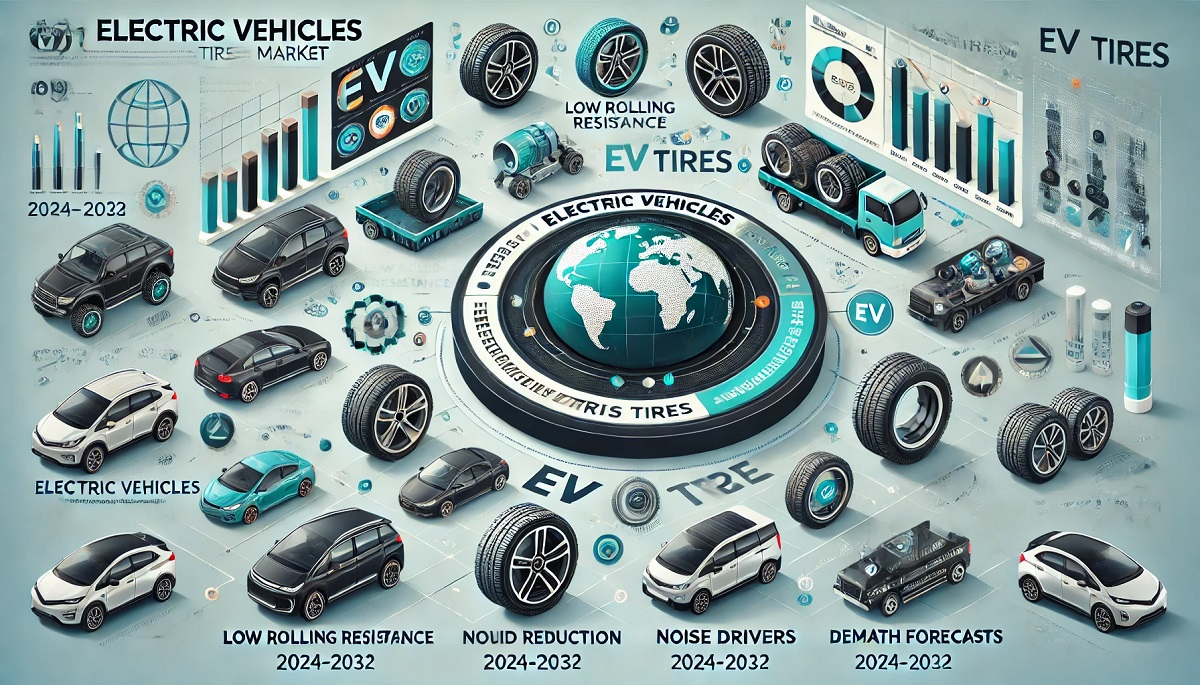The Electric Vehicles (EV) Tires Market report by MarketDigits provides an in-depth analysis of key factors shaping the industry, including market segmentation by tire type, distribution channels, end-users, and geographical regions.
It highlights the partner and customer ecosystem, focusing on product services, propositions, and key features.
The competitive index and regional footprints offer insights into market dynamics, identifying leading players and their strategic positions.
The forecast for 2024–2032 predicts significant growth in the EV tire market driven by the increasing adoption of electric vehicles and innovations in tire technology tailored to EVs' unique requirements.
Get the Sample Research Report Copy on Electric Vehicles (EV) Tires Market: https://www.marketdigits.com/request/sample/3688
Why the Demand for Electric Vehicle (EV) Tires Has Increased in Recent Years
The demand for Electric Vehicle (EV) tires has experienced a significant surge in recent years, driven by multiple factors aligned with the rapid growth of the electric vehicle market and advancements in tire technology. These factors include the following:
Surge in Electric Vehicle Adoption The global shift toward electric vehicles (EVs) has been one of the primary drivers for increased demand for EV-specific tires. In 2024, electric vehicles represented 9.2% of all new car sales globally, marking a substantial 121% year-on-year increase. This growing adoption is leading to a rise in the need for tires that cater specifically to the unique requirements of electric vehicles.
Unique Tire Requirements of EVs Electric vehicles have distinct features, such as instant torque delivery and increased vehicle weight due to heavy battery packs. These characteristics necessitate specialized tires. EV tires are designed with low rolling resistance to optimize energy efficiency, improve range, and offer durability under high torque and weight. As the demand for electric vehicles grows, so does the need for high-performance tires engineered to meet these specific challenges.
Government Incentives and Policies Government policies around the world have played a significant role in boosting the adoption of electric vehicles. These policies indirectly fuel the demand for EV tires. In 2024, the Indian government introduced the PM E-DRIVE scheme, which aims to promote EV adoption and the development of charging infrastructure, thereby expanding the market for EV-specific tires.
Technological Advancements in Tire Design Advancements in tire technology tailored for electric vehicles have further driven the demand. Innovations include the development of low rolling resistance tires and enhanced durability, which are essential for improving the performance, safety, and longevity of electric vehicles. These technological advancements not only address the specific needs of electric vehicles but also enhance the overall driving experience.
Why the Demand for EV Tires is expected to Continue Growing
Looking forward, the demand for electric vehicle tires is poised for further growth due to several key factors:
Ongoing Government Support and Regulatory Push Government initiatives supporting EV adoption, such as tax incentives, subsidies, and stricter emissions regulations, are expected to accelerate the transition to electric mobility. As governments introduce more supportive measures and set higher EV adoption targets, the demand for EV tires will rise correspondingly.
Advancements in Charging Infrastructure The expansion of EV charging infrastructure worldwide is another factor that will positively influence the demand for electric vehicles and their tires. With better access to charging stations and faster charging technologies, consumer confidence in electric vehicles is expected to increase, further boosting the demand for EV-specific tires.
Top Innovations in Electric Vehicles (EV) Tires Market by Leading Companies | Bridgestone, Michelin, and Goodyear (2024-2025)
Bridgestone: Innovations in Tire Technology
ENLITEN Technology
Bridgestone’s ENLITEN technology is designed to enhance tire performance by reducing both weight and rolling resistance. This innovation improves fuel efficiency and extends tire lifespan, making it particularly well-suited for electric vehicles (EVs), which require tires capable of supporting increased weight and torque. In April 2024, Bridgestone received the 'Tire Manufacturer of the Year' award at the Tire Technology International Awards for Innovation and Excellence, recognizing its commitment to sustainability and groundbreaking tire solutions.
Turanza 6i Tire
Launched in April 2024, Bridgestone's Turanza 6i tire caters to premium passenger vehicles, including SUVs, CUVs, sedans, and hatchbacks. By incorporating ENLITEN technology, the Turanza 6i offers a quieter, more comfortable ride while enhancing fuel efficiency and wear life. This tire is designed with the specific needs of electric vehicles in mind, making it an excellent fit for the growing EV market.
Michelin: Leading Innovations for Future Mobility
Uptis (Unique Puncture-proof Tire System)
Michelin's innovative Uptis tire eliminates the need for air, making it completely puncture-proof. Made with a combination of aluminum rims and patented composite materials, the Uptis maintains its shape and performance even when pierced by foreign objects such as nails. This groundbreaking design provides enhanced safety and convenience, as it eliminates the risk of flat tires. The Uptis is currently undergoing public road tests and is expected to enter mass production in 2024, marking a major advancement in tire technology.
Goodyear: Advancing Tire Performance for Electric Vehicles
ElectricDrive 2 Tire
The ElectricDrive 2 tire, unveiled at CES 2024, is specifically designed for electric vehicles. It features reduced rolling resistance and incorporates SoundComfort Technology to minimize interior vehicle noise, improving the driving experience. This tire is set to be available in the United States in May 2024, with sizes compatible with popular EV models such as the Tesla Model Y, Model 3, Model S, and the Ford Mustang Mach-E.
Goodyear SightLine Technology
In partnership with ZF, Goodyear developed SightLine, a tire intelligence system integrated with vehicle motion control software. This technology offers real-time tire and road data to the vehicle's computer, enhancing driving comfort, safety, and efficiency. SightLine is being implemented in autonomous fleets, including Gatik’s middle-mile logistics operations, to optimize performance and ensure safer operations.
Get the complete view of 194 Pages Market Research Report on Electric Vehicles (EV) Tires: https://www.marketdigits.com/electric-vehicles-tires-market-1701244253
FAQs on Electric Vehicles (EV) Tires Market
1. Do Electric Cars Need EV Tires?
Electric vehicles (EVs) don’t absolutely require tires labeled as “EV tires,” but using tires specifically designed for EVs is highly recommended. EVs tend to be heavier due to their battery packs and offer instant torque, which can lead to increased tire wear. Tires designed for EVs are engineered to handle these unique demands, providing better traction, enhanced performance, and increased safety. By using EV-specific tires, you ensure your vehicle’s tires are optimized for its weight, torque, and handling characteristics.
2. What Is Special About EV Tires?
EV tires are specifically engineered to meet the unique needs of electric vehicles. Some key features that set EV tires apart include:
Enhanced Load Capacity: Electric vehicles are generally heavier than traditional vehicles because of their large battery packs. EV tires are designed with reinforced structures to support this additional weight, ensuring durability and stability.
Low Rolling Resistance: To maximize driving range, EV tires are built with low rolling resistance. This reduces the amount of energy required to keep the tire moving, helping to improve the vehicle’s energy efficiency and extend the driving range on a single charge.
Noise Reduction: As electric vehicles are quieter than traditional vehicles, tire noise becomes more noticeable. To address this, EV tires often feature sound-absorbing materials and designs that minimize road noise, enhancing comfort inside the cabin.
3. Who Makes EV Tires in the U.S.?
Several leading tire manufacturers in the United States produce tires specifically designed for electric vehicles. Some of the top companies include:
Michelin: Michelin offers a range of EV-ready tires that optimize factors like range, performance, and wear. The company is a recognized leader in the development of tires for electric vehicles.
Hankook Tire: Hankook provides a selection of electric vehicle tires designed to enhance driving performance and safety. The company’s EV tires are tailored to meet the unique demands of electric mobility.
Yokohama Tire: Yokohama has developed EV-specific tires that offer excellent durability, performance, and energy efficiency. These tires are designed to meet the specialized needs of modern electric vehicles.
Other Trending Reports
Next Generation In-vehicle Networking (IVN) Market: https://www.marketdigits.com/next-generation-in-vehicle-networking-ivn-market
Autonomous Truck Market: https://www.marketdigits.com/autonomous-truck-market
Automotive 3D Printing Market: https://www.marketdigits.com/automotive-3d-printing-market



